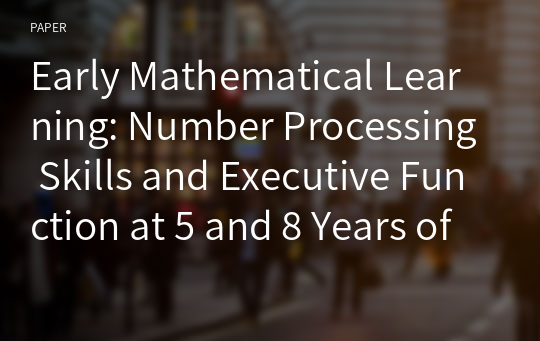Early Mathematical Learning: Number Processing Skills and Executive Function at 5 and 8 Years of Age
* 본 문서는 배포용으로 복사 및 편집이 불가합니다.
서지정보
ㆍ발행기관 : 환태평양유아교육연구학회
ㆍ수록지정보 : Asia-Pacific journal of research in early childhood education / 9권 / 3호
ㆍ저자명 : Sonia L. J. White, Donna Berthelsen, Sue Walker, Kate E. Williams
ㆍ저자명 : Sonia L. J. White, Donna Berthelsen, Sue Walker, Kate E. Williams
목차
IntroductionMethod
Results
Discussion
References
한국어 초록
This research investigated differences and associations in performance in number processing andexecutive function for children attending primary school in a large Australian metropolitan city. In across-sectional study, performance of 25 children in the first full-time year of school, (Prep; mean age =5.5 years) and 21 children in Year 3 (mean age = 8.5 years) completed three number processing tasksand three executive function tasks. Year 3 children consistently outperformed the Prep year children onmeasures of accuracy and reaction time, on the tasks of number comparison, calculation, shifting, andinhibition but not on number line estimation. The components of executive function (shifting, inhibition,and working memory) showed different patterns of correlation to performance on number processingtasks across the early years of school. Findings could be used to enhance teachers’ understanding aboutthe role of the cognitive processes employed by children in numeracy learning, and so inform teachers’classroom practices.영어 초록
This research investigated differences and associations in performance in number processing andexecutive function for children attending primary school in a large Australian metropolitan city. In a
cross-sectional study, performance of 25 children in the first full-time year of school, (Prep; mean age =
5.5 years) and 21 children in Year 3 (mean age = 8.5 years) completed three number processing tasks
and three executive function tasks. Year 3 children consistently outperformed the Prep year children on
measures of accuracy and reaction time, on the tasks of number comparison, calculation, shifting, and
inhibition but not on number line estimation. The components of executive function (shifting, inhibition,
and working memory) showed different patterns of correlation to performance on number processing
tasks across the early years of school. Findings could be used to enhance teachers’ understanding about
the role of the cognitive processes employed by children in numeracy learning, and so inform teachers’
classroom practices.
참고 자료
없음"Asia-Pacific journal of research in early childhood education"의 다른 논문
 Mathematics using multiple senses: Developing finger gn..12페이지
Mathematics using multiple senses: Developing finger gn..12페이지 Using drawings and discussion to gain insights into you..14페이지
Using drawings and discussion to gain insights into you..14페이지 The role of units in the concept of length for four- to..17페이지
The role of units in the concept of length for four- to..17페이지 Number-Fact Knowledge and Mathematical Problem-solving ..17페이지
Number-Fact Knowledge and Mathematical Problem-solving ..17페이지 Young Children’s Early Deductive Reasoning in Number: A..21페이지
Young Children’s Early Deductive Reasoning in Number: A..21페이지


























